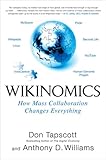 The idea of collaboration is not new. The saying information wants to be free has its roots in the year 1984, which is also a fairly well known book. What’s the point? The point is that information technology people are either building open information models or closed information models. Don Tapscott advocates the power of open collaboration when it comes to information models.
The idea of collaboration is not new. The saying information wants to be free has its roots in the year 1984, which is also a fairly well known book. What’s the point? The point is that information technology people are either building open information models or closed information models. Don Tapscott advocates the power of open collaboration when it comes to information models.
The best ideas for your business might come from someone who doesn’t even work for you. That’s the contention made by author and consultant Don Tapscott in his newest book, Wikinomics: How Mass Collaboration Changes Everything. Tapscott, along with coauthor Anthony D. Williams (who teaches at the London School of Economics), believes that the pervasiveness of the Internet will usher in an era where companies will lower their proprietary barriers and collaborate to foster greater innovation. As people employ instant messaging, blogs, wikis and other Web-based applications to communicate and develop ideas, Tapscott believes the Internet will become a platform on which companies will be forced to seek external talent in order to solve their greatest challenges.
In the spirit of this idea, and because of economic necessity (think survival mode), I am testing out Spiceworks on behalf of my employer. As budgets tighten and my employer looks for ways to cut the fat, open information models and collaboration become more and more attractive. Why pay a consultant tens of thousands of dollars to answer a question that I can get answered for free?
If the choice is protecting IP versus innovation, you’ve got to default to innovation. You can’t win by living off your morals in this new global economy. Rob McEwen went with innovation. You’ve got to innovate or die. And that means you need to think differently about intellectual property. I’m not suggesting you open up the kimono on everything. But increasingly, if you’re going to peer produce things and mass collaborate, if you’re going to get more deeply involved in collaborating on precompetitive research, then you need a portfolio of IP-some that you own and some that you share.
Innovate or die. Adapt or become extinct. There is a reason that old, unyielding executive in companies are called dinosaurs. Without real innovation, it is possible that the United States of America itself will become a dinosaur and go extinct. In fact, I think it is likely without real change. We’re not talking about a campaign slogan. We’re talking about a fundamental shift in attitudes towards innovation that starts with rethinking the openness of our information models. I’m adding Don Tapscott’s book, Wikinomics: How Collaboration Changes Everything to my reading list. I hope it will reinforce my own internalization of the moniker “information wants to be free” and give me ammunition to help convince others around me that open information models are always better than closed information models.